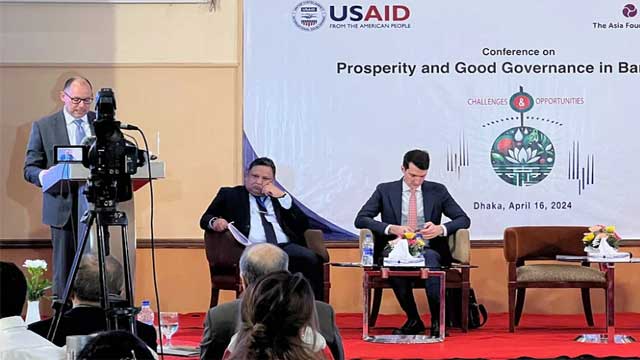Political rights in Bangladesh have witnessed a significant decline over the past three decades, according to the US-based think-tank Atlantic Council’s new global Freedom and Prosperity report. It said that this decline is alarming, indicating a downward trend in the protection and exercise of rights crucial to the democratic political process.
The decline in political freedom can be attributed to several factors, including a notable impact from diminishing civil liberties and political rights, as well as pressures on the electoral system, the report mentioned.
The erosion of these liberties can occur through various means, including increased censorship, and restrictions on peaceful protests and individual expression, it said.
Bangladesh ranks 141 out of 164 countries on the Freedom Index, securing second lowest score after Afghanistan in South Asia with a declining trend for 22 consecutive years.
‘Today, Bangladesh finds itself positioned 141st out of 164 countries on the Freedom Index, placing it within the “mostly unfree” category. This index comprehensively assesses both economic and political freedoms, along with adherence to the rule of law,’ said the report shared at an event in the Dhaka city on Tuesday.
Bangladesh falls behind Nepal, Bhutan, Sri Lanka, India and Pakistan in South Asia on the index which includes political, economic and legal components as per the report.
Bangladesh is placed 8th among 12 countries studied in South and Central Asia.
In Bangladesh, the data shows that the report’s Freedom Index has been declining for 22 years in a row, said a release from the US Embassy in Dhaka.
The US Embassy Dhaka’s United States Agency for International Development and The Asia Foundation jointly organised a Prosperity and Good Governance Conference to share findings from the Atlantic Council’s Freedom and Prosperity Report.
‘Every country grapples with issues like corruption and securing economic and political rights. The key lies not in avoiding problems, but in actively acknowledging and tackling them,’ said US ambassador to Bangladesh Peter Haas speaking at the event.
Addressing the event as keynote speaker, Joseph Lemoine, Director of the Atlantic Council’s Freedom and Prosperity Center, said that the data shows that countries with greater freedom tend to enjoy higher levels of prosperity, while those with less freedom tend to have lower levels of prosperity.
‘Countries that promote political and economic freedoms, along with strong legal systems, create an environment that’s more welcoming to foreign investors,’ he said, adding that freer countries receive significantly more foreign direct investment than those with less freedom.
He highlighted key findings from the report, which measures and ranks countries’ democratic and governance indicators in its Freedom Index, as well as its Prosperity Index that measures a nation’s economic wellbeing.
The Prosperity and Good Governance Conference brought together representatives from the government, civil society, businesses, donors, academia and think tanks, according to the release.
The Freedom and Prosperity Indexes are two separate indices that rank 164 countries around the world according to their levels of freedom and prosperity.
Bangladesh’s ranking of 99 out of 164 on the Prosperity Index, categorises it as ‘mostly unprosperous’.
Overall, the Freedom Index suggests that a strong commitment to freedom is key to attracting foreign investment.
The report mentioned that Bangladesh, a nation born from a fight for democracy, has set its sights firmly on the future and its pursuit of a prosperous future is undeniably intertwined with the level of its freedoms.
‘However, recent events paint a complex picture. The January parliamentary elections solidified a shift toward a “dominant-party” system,’ it said.
The Awami League capitalised on an opposition boycott to extend its fifteen-year rule, with prime minister Sheikh Hasina poised to become the world’s longest-serving female head of government, the report categorically mentioned.
‘While this signifies stability, dominant-party systems often face challenges that can undermine good governance. Ensuring healthy competition across politics, government and the economy is crucial to mitigate these risks,’ it said.
Despite an overall decline in freedom, Bangladesh, however, has demonstrated resilience in terms of prosperity.
On the Prosperity Index, the country stands 99th out of 164 countries, which categorises it as ‘mostly unprosperous’.
‘However, these declines in freedom have certainly impeded its progress. Drawing from our data, we can pinpoint opportunities for the government of Bangladesh to enact critical reforms aimed at supporting long-term prosperity,’ the report said.
Political freedom in Bangladesh has been on a downward trajectory since 2000. Back in 1999, Bangladesh held the 108th position globally in terms of political freedom.
‘Today it has slipped to rank 130th out of the 164 countries covered by the study. This decline raises significant concerns about the state of political liberties within the country,’ it said.
On the Freedom Index, Denmark is placed on the top followed by Sweden, while the United Kingdom and the US rank 19th and 20th respectively.





